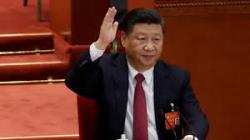By Mark Langabeer, Newton Abbot Labour member
A documentary series available on BBC i-player gives an account of the Xi Jinping presidency from a variety of stand points. It is a three-part series which begins with a report of the oppressive nature of Xi’s regime. The narrator, Sophie Black, interviewed a teacher and Communist Party member, who was instructed to teach at a huge detention centre. The occupants of the centre were mainly people from ethnic minorities and her job was to teach them Chinese.
The centres are euphemistically called Re-education Centres by the Chinese government, but in reality, they are prisons, where reports from this teacher and other sources suggest that brutality and torture is routine. In particular, it’s the Uighurs, Muslim people, who have borne the brunt of this repression in the province of Xinjiang. Hundreds of thousands of Uighurs have been placed in camps and some reports put the number as high as a million.
This has been the response of the government to alleged attacks on Han Chinese people in Xinjiang. Although a commentator described this as “China’s war on terrorism”, the policy is little short of ethnocide – forcibly wiping out a language and a culture.
No democratic rights
There is no democratic right to protest or criticise the leadership in China. One example was given of a small group who organised a protest, demanding that Xi should publish his private wealth and the organiser of the protest ended up being sentenced to 18 months imprisonment.
Then there is the situation in Hong Kong. In 1997 the British government were required to hand over Hong Kong to the Chinese, effectively transferring from one master to another. A mass movement has arisen since then, over the issue of the rights of the mainland Chinese government to extradite Hong Konger’s to the mainland. This was not a matter of nationality or a defence of capitalist property relations in Hong Kong, but is seen by protesters as a defence of democratic rights.
The programme gave the example of a bookshop in Hong Kong that sold books critical of the Chinese government. They were being bought not only by locals, but also by visitors from the Chinese mainland; now the proprietor has disappeared while his colleague had been imprisoned for ‘counter- revolutionary’ activities. Hong- Kong residents fear a loss of the freedoms they have enjoyed and are demanding democratic control over their lives. The battle over extradition appeared at first to have been won, but it seems to have been only a temporary respite, as recent events show that the Chinese government is not letting up on exerting its control and authority over Hong Kong.
The programme asked why over a billion Chinese people tolerated a repressive government. One commentator suggested that the government is actually popular because hundreds of millions of its people no longer lived in absolute poverty. Xi was popular, it was said, because of his stewardship of the Beijing Olympic games in 2008 and for a crackdown on corruption – around half a million Communist Party members are reported to have been detained over allegations of corruption. One commentator even said that his support was reminiscent of Mao’s during the Cultural Revolution. But it is clear that China is essentially a police state where it requires an extraordinary degree of courage to speak openly against the government.
Western powers rolled out the red carpet
Despite the poor human rights record of China, the first response of most western powers to Xi coming into office was to roll out the red carpet for him. They hoped he would continue ‘reforms’ in the direction of capitalist development and the ‘free’ market and increase trade with the rest of the world. Those earlier attempts to woo the Chinese leader seemed to have soured and have been replaced with vitriolic attacks, tariffs and trade wars, particularly on the part of the USA.
The western powers have long accused China of industrial espionage and thereby posing a threat to national security. But there’s a lot of hypocrisy in this – the modern industrialisation of the USA in the late eighteenth and early twentieth century was based entirely on stealing patents and manufacturing methods from Europe. So-called intellectual property rights (patents) are a prime example of how the capitalist system acts as a brake on development. If the means of production was commonly owned and production organised for the benefit of the whole of the population, it wouldn’t matter who developed new products.
US spends far more on arms
It is pretty rich to hear about China’s supposed ‘aggression’ because their minor border skirmishes with neighbouring states over the years are miniscule compared to the frequent invasions and occupations visited on a whole variety of states by US and its NATO allies. The US spends far more on its armed forces than China at the moment, but the western powers are afraid that China’s growing economic power is making it a rival superpower to the US. At a later stage, it is feared, that economic power will translate into military power. In its own backyard, the South China Sea, China has already effectively eclipsed the US militarily.
From a Marxist standpoint, an important question is the class nature of the Chinese State? Some have argued that it is a capitalist state because of the massive significance of big privately-ownership corporations and the billionaires in the leadership of the CCP. But it is significant that this programme suggested that the Communist Party in China still calls the shots and that this is the principle reason for the antagonism between the US and China. In fact, US/Chinese trade talks have stalled in the past specifically because the Chinese have refused US demands for the economy to be further ‘opened up’ to the ‘free’ market and for government direction of the economy to be wound down.
The key question is not whether big private corporations exist, but whether the decisive parts of the economy are still in the hands of the state and the ‘Communist’ Party and whether they are therefore subject to direction and state planning. One thing is clear, however: China might claim to be ‘socialist’ and use socialist terminology, but it is not socialist or communist or anything like it; at best, it represents a modern variant of Stalinism. It is a discussion that is still ongoing in the Marxist left and needs to continue.
August 24, 2020



